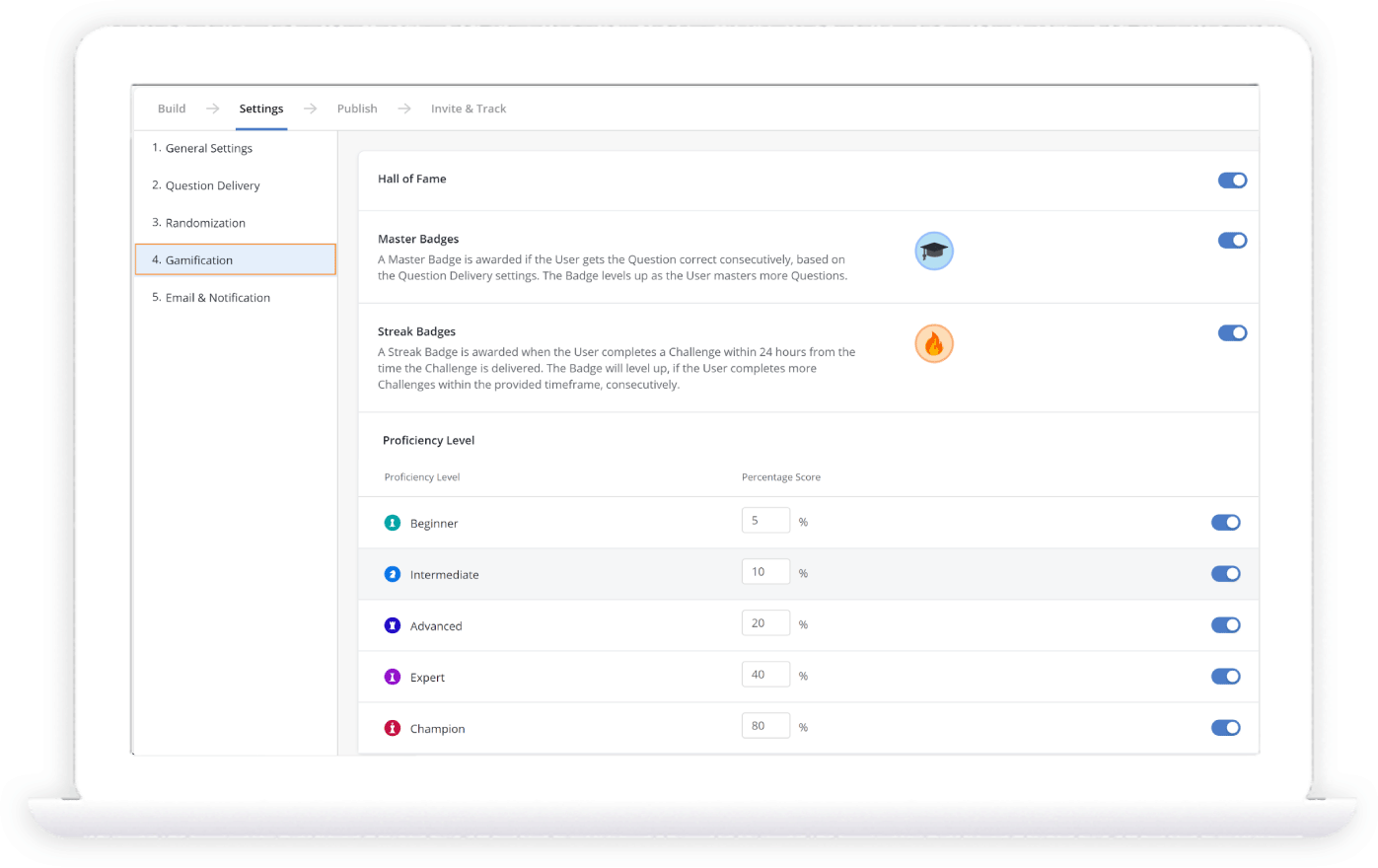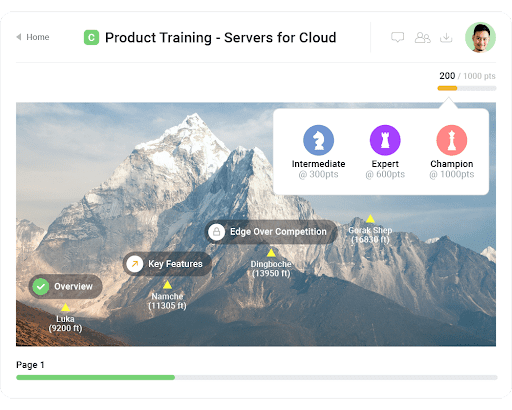Your sales reps are likely to be the most in-demand people in your company. Every team wants their time and attention to make sure the right products and messages get in front of prospective customers. And sales training is where this popularity can cause unexpected problems.
Well-intentioned sales enablement teams take the initiative and create training resources for your sales reps to read, watch, or complete. But they only do so on an ad-hoc basis. Every team is so focused on their own priorities — whether it’s the latest product feature or new marketing messaging — that they don’t consider what your sales team needs to know about those things until the very last minute.
So your reps feel like new training activities are coming at them from every direction. Instead of enabling your sales reps with the information and knowledge, they need to succeed, an ad-hoc approach to sales training is distracting and overwhelming.
Ad-hoc sales training causes more problems than it solves
Ad-hoc sales training is when training for your sales team gets rolled out without advance planning, a set timeline, or a clear strategy.
Sometimes ad-hoc training is the best option for sales teams because you can roll it out quickly in response to market changes or competitor updates. However, it often creeps into big companies and becomes the primary method of training.
An ad-hoc approach can prevent your sales team from reaching its full potential and, ultimately, lose new customers. Reps will struggle to learn from training materials and find it difficult to retain the information they need to successfully engage with prospects, and managers cannot tailor training to the needs of individual sales reps.
Reps disengage with ad-hoc sales training
Sales reps disengage with ad-hoc sales training when they’re required to complete every single exercise, regardless of whether it’s relevant to their existing skills, experience, or area of focus. They may think the time spent completing the training could’ve been spent nurturing leads and working toward their monthly quota. And if you make all of your reps go through the exact same training program, they might be right.
Unfortunately, disengagement spreads quickly. For example, suppose one of your more experienced reps stops completing your training because they’re already familiar with the subject matter. In that case, other, more junior reps may follow suit and miss out on the information they need to level up their sales skills.
Even worse, when reps disengage with their training, they don’t retain (or acquire in the first place) the knowledge, skills, or information you are trying to share. They start to see sales training as a box-ticking exercise rather than a valuable ongoing process investing in their personal development.
Reps get lots of new information but can’t connect the dots
An ad-hoc approach to sales training lacks an overarching strategy. Without a strategy, reps don’t have the necessary context to help them understand how each element of their training will improve their overall performance and help them hit quota.
For example, in a single month, your reps may need to complete:
- Training with multiple product managers to learn about new features coming to each product
- Messaging training from your marketing team
- Sales skills training focused on common skills such as objection handling or running effective demos
In this scenario, your reps will get lots of new information. But there’s no common theme or recurring idea to help them join the dots and put the ideas into practice.
While you’ll sometimes need to roll out ad-hoc training exercises in response to changes in the market or competitive landscape, you can still put together an overarching strategy for training that focuses on building reps’ sales skills or product knowledge.
A strategy means there’s a logical progression to the training. For example, a sales manager might deliver a session for their reps on running effective demos. The next week, the reps could record virtual demos to put that training into practice. You could also supplement this with microlearning activities like quizzes or short challenges to remind reps of demo best practices. Different exercises should build on topics you covered before, to ensure your training combines new information with refresher exercises to improve information retention.

Reps struggle to retain knowledge and put skills into practice
Ad-hoc sales training can lead to information overload. Too many different training exercises can leave your reps feeling overwhelmed by all the new information. And if reps are being bombarded with new information, there’s no time for reinforcement, making it difficult for them to retain that knowledge or skill to use in their sales interactions.
Ad-hoc sales training is often treated as a one-and-done activity: you covered the new product messaging with your reps — check! But that assumes your sellers have perfect information recall and that, after a single training session, they’ll be able to use that new messaging perfectly in their next sales call.
Unfortunately, most sales reps don’t have superhuman memory skills. A lack of spaced reinforcement of your sales training can cause inaccuracies, inconsistent messaging, or uncertainty in sales conversations because your reps haven’t practiced their training. This can erode trust in your business because prospects think of your representatives as the experts on your product… but when sales reps can’t remember the latest information about features and updates, they’ll appear unprofessional and unprepared.
Managers can’t tailor training to individual reps
Ad-hoc training from product or marketing teams is often shared with sellers on short notice with little advance information about what it’ll cover. This means managers can’t tailor the training to their reps based on individual skills gaps, knowledge gaps, or behaviors that need improving.
But all your reps have different skill levels, experiences, and strengths, so it doesn’t make sense to put all of them through the same cookie-cutter sales training exercises. For example, if you have one rep with just a couple of years of experience who’s been with your company the whole time, they’ll have different knowledge gaps than a rep with 20 years of experience who’s new to your company. Of course, both reps have their own strengths and weaknesses, but ad-hoc sales training means they both have to complete the same exercises.


Instead of a constant flurry of ad-hoc activities, you need an agile training program you can easily tailor to the needs of each seller. Your sales training will be more effective if it’s individualized to each rep. Sellers will be able to focus on areas where they can make the most significant improvements and not waste time going over topics or skills they excel at. But if managers don’t know ahead of time what the next training module will cover, they can’t segment their reps based on existing skills and competencies and identify who should and shouldn’t complete the training.
Discover a smarter way to train and enable your sales teams
There will always be unplanned updates and market changes your reps need training on. But there are lots of sales skills and company- and product-related information that’s easier to anticipate. Your sales enablement team will know the most pertinent topics and focus areas to help sellers build up their product knowledge and develop their skills.
The antidote to ad-hoc training is to embrace the idea of sales readiness. This involves a culture of continuous learning and improvement. It encourages ongoing learning through a mix of training, reinforcement, and practice to set your reps up for success. Adopting a team culture of ongoing improvement can help companies move away from ad-hoc sales training and develop agile programs designed around the needs of their sellers.
Ready to learn more, and take the first step in building an ongoing approach to sales training? Check out this eBook: Ramp Time to Productivity: Why Sales Everboarding is the Secret to Your Success.







